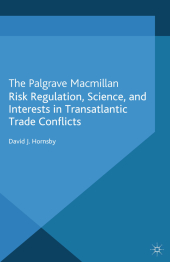 Neuerscheinungen 2014Stand: 2020-02-01 |
Schnellsuche
ISBN/Stichwort/Autor
|
Herderstraße 10
10625 Berlin
Tel.: 030 315 714 16
Fax 030 315 714 14
info@buchspektrum.de |

D. Hornsby
Risk Regulation, Science, and Interests in Transatlantic Trade Conflicts
1st ed. 2014. 2014. xi, 260 S. 216 mm
Verlag/Jahr: SPRINGER PALGRAVE MACMILLAN; PALGRAVE MACMILLAN UK 2014
ISBN: 1-349-44174-0 (1349441740)
Neue ISBN: 978-1-349-44174-7 (9781349441747)
Preis und Lieferzeit: Bitte klicken
When regions like Canada, the US and the EU have disagreed over the legitimacy of risk perceptions they have placed science at the centre of international trade conflict. By looking across cases disputed and informally resolved, David Hornsby offers to deepen understanding of factors involved in risk based trade conflict.
1. Introduction: the Intersection of Risk and Trade 2. Science in the Regulation of Risk: A Transatlantic Divide? PART I: INFORMAL TRADE CONFLICT 3. Mad Cows and Transatlantic Trade Conflict 4. Resolving Differences over Stinky Cheese and Bothersome Beetles PART II: FORMAL TRADE CONFLICT 5. The Dispute over Hormonal Cattle: the lead up to EC-Hormones 6. Fearing ´Frankenfoods´: emergence of EC-Biotech 7. Disputing Chlorinated Chickens: the politics underpinning EC-Poultry PART III: THE RELEVANCE OF SCIENCE 8. Science and the Politics of Transatlantic Trade Conflict 9. Conclusions: Lessons for Trade Conflict
"This book offers a penetrating analysis of the role entrusted to science in determining the legality of risk regulations enacted by countries around the world in the exercise of their regulatory autonomy. By blending a broad analysis of the politics of risk-based trade conflict with the international political economy of science in trade, it offers a significant contribution to the understanding of the interplay of interests, institutions and ideas governing today´s trade regime. At a time of renewed international regulatory co-operation efforts, the publication of Hornsby´s book appears timely and prescient." - Alberto Alemanno, HEC, France
"This is an impressive study that addresses a real gap in the risk-trade literature. Hornsby treats the topic from an interdisciplinary perspective, adding the political and economic aspects to capture the essence of transatlantic trade conflict also at the pre-formal dispute level. As a result, his account is far more reflective of the risk-science issues that the WTO actually faces." - Gretchen H. Stanton, World Trade Organisation, Switzerland
"David Hornsby´s book on the role of science in transatlantic trade disputes is a timely and sophisticated intervention into a growing literature on the World Trade Organization´s involvement in disputes over sanitary and phytosanitary measures. Combining his experience biomedical research with some important insights from the social studies of science, Hornsby carefully investigates six case studies of both formal and informal dispute settlement processes in the WTO, from BSE and raw milk, to invasive species. His study offers a robust - though self-consciously pragmatic - defence of the ability of expert communities of scientists to help resolve trade conflicts. The issues raised in this book are not amenable to easy resolution, and Hornsby has done us a service in highlighting them in a clear, informed and sophisticated way." - Andrew Lang, London School of Economics, UK
"As trade policy pursues its inward migration and interacts increasingly with domestic regulations, few issues are as contentious as the commercial tensions stemming from cross-country differences in attitudes towards risk and uncertainty. David Hornsby´s timely contribution offers fresh insights into the rising salience of trade conflict emerging at the intersection of risk, science and commerce. Hornsby´s work documents the sources of continued transatlantic disconnect in this area and its complex political economy. His book offers a convincing narrative of why greater attention to the use of scientific evidence in international trade governance is required.´ - Pierre Sauvé, World Trade Institute, Switzerland


